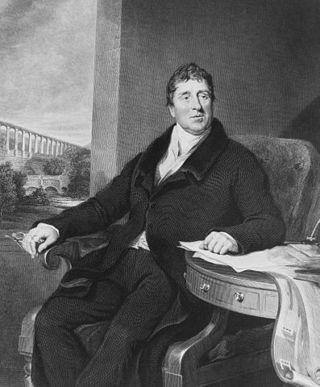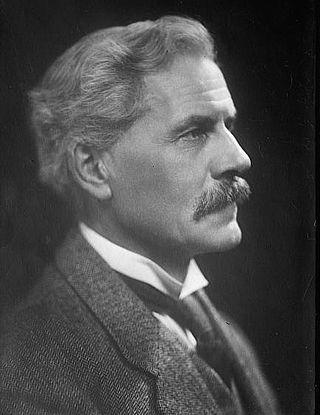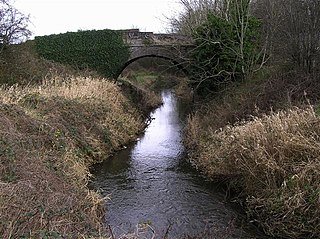Related Research Articles

Thomas Telford was a Scottish civil engineer. After establishing himself as an engineer of road and canal projects in Shropshire, he designed numerous infrastructure projects in his native Scotland, as well as harbours and tunnels. Such was his reputation as a prolific designer of highways and related bridges, he was dubbed the Colossus of Roads, and, reflecting his command of all types of civil engineering in the early 19th century, he was elected as the first president of the Institution of Civil Engineers, a post he held for 14 years until his death.

The United States Department of Labor (DOL) is one of the executive departments of the U.S. federal government. It is responsible for the administration of federal laws governing occupational safety and health, wage and hour standards, unemployment benefits, reemployment services, and occasionally, economic statistics. It is headed by the Secretary of Labor, who reports directly to the President of the United States and is a member of the president's Cabinet.

Telford is a town in Shropshire, England. It is the administrative centre of Telford and Wrekin borough, a unitary authority which covers the town, its suburbs and surrounding settlements. The town is inland and near the River Severn.

The Local Government Board (LGB) was a British Government supervisory body overseeing local administration in England and Wales from 1871 to 1919.

The Office of Public Works (OPW) is a major Irish Government agency, which manages most of the Irish State's property portfolio, including hundreds of owned and rented Government offices and police properties, oversees National Monuments and directly manages some heritage properties, and is the lead State engineering agency, with a special focus on flood risk management. It lies within the remit of the Minister for Public Expenditure, National Development Plan Delivery and Reform, with functions largely delegated to a Minister of State at the Department of Public Expenditure, National Development Plan Delivery and Reform with special responsibility for the Office. The OPW has a central role in driving the Government's property asset management reform process, both in respect of its own portfolio and that of the wider public service. The agency was initially known as Board of Works, a title inherited from a preceding body, and this term is still sometimes encountered.

The second MacDonald ministry was formed by Ramsay MacDonald on his reappointment as Prime Minister of the United Kingdom by King George V on 5 June 1929. It was only the second time the Labour Party had formed a government; the First MacDonald Ministry held office in 1924.

Sir Robert Rawlinson KCB was an English engineer and sanitarian.

The Metropolitan Water Board was a municipal body formed in 1903 to manage the water supply in London, UK. The members of the board were nominated by the local authorities within its area of supply. In 1904 it took over the water supply functions from the eight private water companies which had previously supplied water to residents of London. The board oversaw a significant expansion of London's water supply infrastructure, building several new reservoirs and water treatment works.

The Philippine Statistics Authority, abbreviated as PSA, is the central statistical authority of the Philippine government that collects, compiles, analyzes and publishes statistical information on economic, social, demographic, political affairs and general affairs of the people of the Philippines and enforces the civil registration functions in the country.

The Ulster Canal is a canal running through part of County Armagh, County Tyrone and County Fermanagh in Northern Ireland and County Monaghan in the Republic of Ireland. The Ulster Canal was built between 1825 and 1842 and was 74 km (46 mi) long with 26 locks. It ran from Charlemont on the River Blackwater to near Wattlebridge on the Finn River, south-east of Upper Lough Erne. It was an ill-considered venture, with the locks built narrower than the other Irish waterways, preventing through trade, and an inadequate water supply. It was an abject failure commercially, and contributed to the collapse of the Lagan Navigation Company, who took it over from the government but were then refused permission to abandon it when they could not afford the maintenance costs. It finally closed in 1931. Waterways Ireland started work on rebuilding the canal at its southern end in 2015.
The Public Works Loan Board (PWLB) was a statutory body of the UK Government that provided loans to public bodies from the National Loans Fund. In 2020, the PWLB was abolished as a statutory organisation, and its functions were allocated to HM Treasury, where they are discharged through the UK Debt Management Office. The members of the PWLB were known as the Public Works Loan Commissioners.
Otanomomo is a locality in the South Otago region of New Zealand's South Island. It is on the banks of the Koau Branch of the Clutha River, roughly six kilometres south of Balclutha. Nearby settlements include Finegand to the north, Paretai, Puerua, and Romahapa to the south, and Waitepeka to the west.

The Islington Tunnel takes the Regent's Canal 960 yards (878 m) under Angel, Islington, as the longest such tunnel in London. The way for short boats and barges only opened in 1818; the pavements above are waymarked so the otherwise discontinued towpaths are connected. The canal's Eyre's and Maida Hill Tunnels, to the west, are much shorter.

Telford and Wrekin Council is the local authority of Telford and Wrekin in Shropshire, England. It is a unitary authority, having the powers of a non-metropolitan county and district council combined. The district of Telford and Wrekin was granted borough status in 2002, though the council does not ordinarily include "Borough" in its name.
Woodside is a residential area of Telford, Shropshire, England.

Joseph Mitchell was a Scottish civil engineer.
George Gordon (1829–1907) was a Scottish born engineer who was prominent in Melbourne in the late nineteenth century.
References
- ↑ "Engineering Timelines - Thomas Telford".
- ↑ Christine Bellamy (1988). Administering Central-Local Relations, 1871-1919: The Local Government Board in Its Fiscal and Cultural Context. Manchester University Press. pp. 81–2. ISBN 978-0-7190-1757-5 . Retrieved 10 March 2013.
